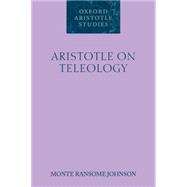
Note: Supplemental materials are not guaranteed with Rental or Used book purchases.
Purchase Benefits
What is included with this book?
| List of Tables | p. ix |
| Abbreviations | p. x |
| Introduction | p. 1 |
| Teleology as a Critical Explanatory Framework | |
| Historical Background to the Interpretation of Aristotle's Teleology | p. 15 |
| Greek, Arabic, and Latin commentary | p. 16 |
| Scholasticism and the scientific revolution | p. 23 |
| Natural theology and the critique of teleology | p. 30 |
| Theophrastus and teleological aporiai | p. 35 |
| Preliminary Study of Aristotle's Causes | p. 40 |
| Responsibility, blame, and cause | p. 40 |
| The four kinds of causes | p. 42 |
| Knowledge, demonstration, and causal explanation | p. 49 |
| Demonstration through 'the cause for the sake of which' | p. 52 |
| Temporal priority | p. 56 |
| Integrating causal explanations | p. 56 |
| Explanatory and non-explanatory causes | p. 59 |
| Teleological Notions | p. 64 |
| The cause for the sake of which | p. 64 |
| Nothing in vain | p. 80 |
| End, limit, and the complete | p. 82 |
| Function, activity, and the thing in a state of completion | p. 85 |
| Axiological terminology: the good, fine, etc. | p. 90 |
| Teleological Dialectic | p. 94 |
| Luck (Empedocles) | p. 95 |
| Necessity and Spontaneity (Democritus) | p. 104 |
| Intelligence (Anaxagoras and Diogenes of Apollonia) | p. 112 |
| God (Xenophon, Socrates) | p. 115 |
| Form (Plato) | p. 118 |
| Teleological Explanations in Natural Science | |
| Teleology and Elements | p. 131 |
| Natural change and motion | p. 132 |
| Celestial elemental locomotion | p. 136 |
| Terrestrial elemental locomotion | p. 140 |
| Elemental transmutation | p. 145 |
| Meteorology | p. 149 |
| Teleology and Organisms i: General Principles | p. 159 |
| Reasoning from phenomenal effects to explanatory causes | p. 160 |
| Genetic order and explanatory order | p. 165 |
| Survival and reproduction as the basis of explanation in the life sciences | p. 171 |
| The insufficiency of necessity alone to account for living natures | p. 178 |
| Mechanism, reduction, and heuristic | p. 182 |
| Teleology and Organisms ii: Specific Explanations | p. 188 |
| Normal Cases | p. 188 |
| Abnormal cases | p. 198 |
| Animal behavior | p. 204 |
| Teleology and Humans | p. 211 |
| Deliberation, intention, art, and science | p. 212 |
| Ultimate ends of humans | p. 217 |
| Different ends of humans and other organisms | p. 222 |
| The use of other living things as instruments | p. 229 |
| Social organisms and organizations | p. 237 |
| Teleology and the Cosmos | p. 247 |
| The primary cause of natural motion | p. 248 |
| The most general teleological explanation of motion | p. 253 |
| No 'teleological' proof for the existence of god in Aristotle | p. 258 |
| Locomotion as the paradigm of change for the sake of something | p. 263 |
| A final aporia: how does the good exist in the universe? | p. 271 |
| Conclusion | p. 287 |
| Bibliography | p. 295 |
| Index of Texts and Commentaries | p. 311 |
| Index of Names | p. 321 |
| Index of Subjects | p. 325 |
| Table of Contents provided by Ingram. All Rights Reserved. |
The New copy of this book will include any supplemental materials advertised. Please check the title of the book to determine if it should include any access cards, study guides, lab manuals, CDs, etc.
The Used, Rental and eBook copies of this book are not guaranteed to include any supplemental materials. Typically, only the book itself is included. This is true even if the title states it includes any access cards, study guides, lab manuals, CDs, etc.